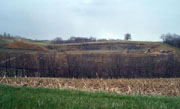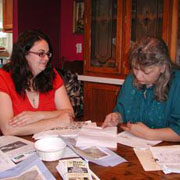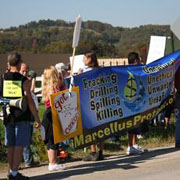-
(单词翻译:双击或拖选)
Black, Foamy2 Water Worries Fracking Neighbors
There is a lot of construction near Janet McIntyre's home in southwestern Pennsylvania. It's not new houses, but new industry: 10 gas wells, a compressor station and multiple drilling-waste ponds.
The state sits atop the nation’s largest deposit of natural gas known as the Marcellus Shale3. What concerns McIntyre and her neighbors is an extraction process called hydraulic4 fracturing or "fracking." It combines deep horizontal and vertical5 drilling with enormous amounts of water, chemicals and sand.
Water troubles
McIntyre never worried about her water before. When she looks out on the wooded rural landscape from her front porch she talks about her well water liked a cherished lost friend. “We never ran out of water. We never had a problem with our water. It was cold coming out of the spigot just as if you went to a regular spring and got it. It was gorgeous water.”
Then one night McIntyre got sick. She had a bad headache and vomited6. When her husband Fred went for a glass of water and turned on the spigot, it spewed out smelly foam1.
“He hollers back, I think I know why we’re sick," she remembers. "There’s something wrong with our water.”
 |
| Land being excavated7 to hold waste water from a fracturing operation in Pennsylvania. |
The McIntyres stopped drinking the well water.
Neighbor Kim McEvoy says her water turned black and she got sick too. “My fingernails were growing downward. My hair was falling out. I’d get dizzy.”
McEvoy and McIntyre complained to the gas company and the Pennsylvania Department of Environmental Protection.
The gas company gave them bottled water.
'Unsafe levels'
Initial tests of McIntyre's well water showed unsafe levels of toluene, a volatile8 and toxic9 petrochemical that causes nausea10 and headaches. McEvoy's well water had arsenic11. Now, months later, new company tests say the water is safe to drink, although trace chemicals are still present.
 |
| Kim McEvoy and Janet McIntyre, who feel their drinking water has been contaminated by nearby natural gas extraction, do some grassroots organizing around the kitchen table. |
Bottled water deliveries end next month.
The two households get their water from private wells, like three million others who live in rural Pennsylvania. The state has no rules on the location, design, testing or treatment of private drinking-water wells. That means contamination could come from other sources like poor well construction or failing septic systems, or gas migrating naturally from adjacent rock or leaking from abandoned mines.
But McEvoy thinks the gas companies are responsible too.
Over the past year she and McIntyre have called on township officials, testified at local hearings, and joined in protests. They want the drilling stopped.
Fracking chemicals in water
Fracking is banned in and around the city of Pittsburgh, and it’s under a moratorium12 in the nearby states of New York and Maryland until health and environmental risks are assessed.
The battle continues on Capitol Hill. Ohio lawmaker Bob Gibbs, whose state stands to gain jobs and revenue from gas development, backs the industry. In a recent house hearing, Gibbs asked Pennsylvania’s Department of Environmental Protection director Michael Krancer about the state’s safety record.
 |
| Local Evans City, Pennsylvania residents picket13 a local dairy that signed a lease with a gas company to fracture a well on its pastures. |
Krancer testified that fracking has never caused a groundwater contamination problem. “Fracking simply doesn’t do that. And there’s still not a documented case,” he said.
Gibbs got the same reply from experts in Ohio and Oklahoma.
But a new draft report released by the U.S. Environmental Protection Agency disputes those claims. Preliminary results of the three-year federal study in Pavillion, Wyoming, show chemicals associated with hydraulic fracturing gas wells in the area are turning up in the ground water.
The EPA findings add weight to the complaints of Pennsylvania landowners like Kim McEvoy and Janet McIntyre.
Closer look
Steve Hvozdovich, Marcellus Shale Campaign director with the Pennsylvania Chapter of Clean Water Action, advises a closer look at the industry. He says in 2010 alone, the Pennsylvania Department of Environmental Protection cited gas drillers 1,200 times for operational violations14.
“Some of those are generic15 administrative16 stuff like paperwork. But the other half are for serious things that can lead to environmental problems. We’re talking about improper17 construction of frack pits. We’re talking about improper disposal of wastewater. We’re talking about improper cement casing jobs which are designed to protect our groundwater aquifers18. We’re talking about venting19 of hazardous20 gas. Now those things to me signify that we have some serious issues going on.”
All this worries University of Pittsburgh School of Public Health professor Bernard Goldstein. He says fracking has already been linked to higher levels of bromide in the water, which is highly toxic.
He believes fracking might also release more radioactivity and arsenic into groundwater. He advocates for baseline studies before drilling and for taking a more comprehensive look at the Marcellus Shale activity.
“We know too little. We’re running ahead as if we’re absolutely sure no problem is going to occur without dong the necessary studies. The gas isn’t going away. The question I have is why are we rushing into this?”
Eyes now are focused on the U.S. Environmental Protection Agency. Beyond its Wyoming report, the EPA is completing a more comprehensive study, requested by Congress in 2010, of the impact hydraulic fracturing might be having on local water supplies. Initial findings are due in 2012.
In the meantime, Janet McIntyre plans to continue her fight to halt the gas drilling. “I want my water back. I want my air back. They took it from me and I want it back.”
 收听单词发音
收听单词发音
1
foam

|
|
| v./n.泡沫,起泡沫 | |
参考例句: |
|
|
|
2
foamy

|
|
| adj.全是泡沫的,泡沫的,起泡沫的 | |
参考例句: |
|
|
|
3
shale

|
|
| n.页岩,泥板岩 | |
参考例句: |
|
|
|
4
hydraulic

|
|
| adj.水力的;水压的,液压的;水力学的 | |
参考例句: |
|
|
|
5
vertical

|
|
| adj.垂直的,顶点的,纵向的;n.垂直物,垂直的位置 | |
参考例句: |
|
|
|
6
vomited

|
|
参考例句: |
|
|
|
7
excavated

|
|
| v.挖掘( excavate的过去式和过去分词 );开凿;挖出;发掘 | |
参考例句: |
|
|
|
8
volatile

|
|
| adj.反复无常的,挥发性的,稍纵即逝的,脾气火爆的;n.挥发性物质 | |
参考例句: |
|
|
|
9
toxic

|
|
| adj.有毒的,因中毒引起的 | |
参考例句: |
|
|
|
10
nausea

|
|
| n.作呕,恶心;极端的憎恶(或厌恶) | |
参考例句: |
|
|
|
11
arsenic

|
|
| n.砒霜,砷;adj.砷的 | |
参考例句: |
|
|
|
12
moratorium

|
|
| n.(行动、活动的)暂停(期),延期偿付 | |
参考例句: |
|
|
|
13
picket

|
|
| n.纠察队;警戒哨;v.设置纠察线;布置警卫 | |
参考例句: |
|
|
|
14
violations

|
|
| 违反( violation的名词复数 ); 冒犯; 违反(行为、事例); 强奸 | |
参考例句: |
|
|
|
15
generic

|
|
| adj.一般的,普通的,共有的 | |
参考例句: |
|
|
|
16
administrative

|
|
| adj.行政的,管理的 | |
参考例句: |
|
|
|
17
improper

|
|
| adj.不适当的,不合适的,不正确的,不合礼仪的 | |
参考例句: |
|
|
|
18
aquifers

|
|
| n.地下蓄水层,砂石含水层( aquifer的名词复数 ) | |
参考例句: |
|
|
|
19
venting

|
|
| 消除; 泄去; 排去; 通风 | |
参考例句: |
|
|
|
20
hazardous

|
|
| adj.(有)危险的,冒险的;碰运气的 | |
参考例句: |
|
|
|















